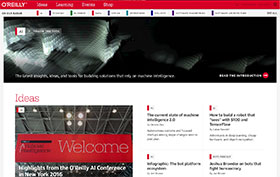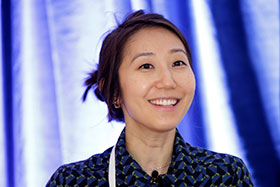About the AI Conference
Why attend | Who you'll meet | The conference experience | Kudos | Program chairs & committee
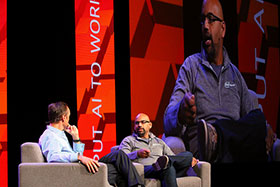
AI is finally moving from being the province of university labs to being a critical part of the software developer's toolkit and a focus for mainstream companies. There is a growing—and urgent—need for information on applied AI, as opposed to the kind of research presented at academic conferences.
That's why we created the Artificial Intelligence Conference.
The AI Conference is where cutting-edge science meets new business implementation. It's a deep dive into emerging AI techniques and technologies with a focus on how to use it in real-world implementations. You'll dissect case studies, delve into the latest research, learn how to implement AI in your projects, share emerging best practices in intelligence engineering and applications, uncover AI's limitations and untapped opportunities and anticipate how AI will change the business landscape.
On June 29, 2017, O'Reilly and Intel Nervana announced a partnership to co-present the Artificial Intelligence Conference. Read more »
Why you should attend
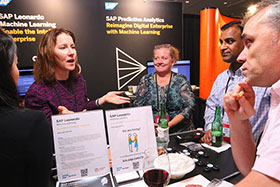
If you want to understand how AI will change the business landscape, or are working with deep learning or AI (or plan to be)—join us at the AI Conference. You'll:
- Be among the first to understand how you can leverage the promise of this huge change, and survive the resulting disruption
- Find new ways to leverage your AI assets across industries and disciplines
- Learn how to take AI from science project to real business application
- Discover learning, hiring, and career opportunities
- Meet-face-to face with other innovators and thought leaders
Who you'll meet
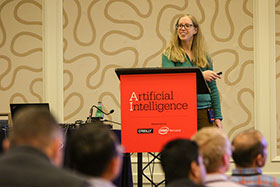
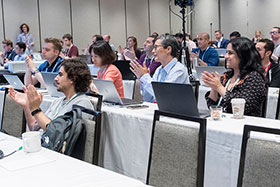
Technical
- Algorithms Engineers/Scientists
- CxOs (Analytics, Data, Information, Innovation, Technology)
- Data Scientists/Engineers
- Research Scientists
- Software Engineers
Business/Strategy
- Business Analysts
- Business Managers, strategists, and decision makers
- Chief Innovation Officers, Innovation Managers, Directors of Innovation
- Chief Investment Officers/Managers
- Product Marketing Managers, Product Managers, Program Managers
The Artificial Intelligence Conference experience
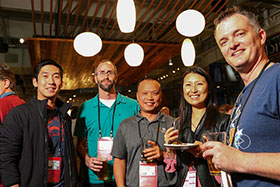
The Artificial Intelligence Conference is a unique opportunity for the brightest minds in applied AI to gather for four intense and invigorating days. You’ll find:
- Inspiring keynotes and practical, information-rich sessions, exploring the latest advances, case studies, and best practices
- Tutorials and training courses designed to investigate tools, algorithms, and applications more deeply
- Networking opportunities with hundreds of other engineers, researchers, developers, program and product managers, innovation officers, and other deep learning professionals in the burgeoning AI field
- A vibrant "hallway track" for attendees, speakers, and journalists to debate and discuss important issues
What people are saying about the AI Conference
–Carl Hinkle
–Eric Martel
–Dan Woods, Forbes
–April Wensel
–Rucha Gokhale
–Evan Wright
–Gill Press, Forbes
Program Chairs
 Ben Lorica
Ben Lorica
(@bigdata) is the chief data scientist at O'Reilly Media, Inc. He has applied business intelligence, data mining, machine learning and statistical analysis in a variety of settings including direct marketing, consumer and market research, targeted advertising, text mining, and financial engineering. His background includes stints with an investment management company, internet startups, and financial services.
 Naveen Rao
Naveen Rao
is the vice president and general manager of artificial intelligence solutions at Intel. Naveen's fascination with computation in synthetic and neural systems began around age 9 when he began learning about circuits that store information and encountered the AI themes prevalent in sci-fi at the time. He went on to study electrical engineering and computer science at Duke, but continued to stay in touch with biology by modeling neuromorphic circuits as a senior project. After studying computer architecture at Stanford, Naveen spent the next 10 years designing novel processors at Sun Microsystems and Teragen, specialized chips for wireless DSP at Caly Networks, video content delivery at Kealia, Inc., and video compression at W&W Comms. After a stint in finance doing algorithmic trading optimization at ITG, Naveen was part of the Qualcomm's neuromorphic research group leading the effort on motor control and doing business development. Naveen was the founder and CEO of Nervana (acquired by Intel), which brings together engineering disciplines and neural computational paradigms to evolve the state of the art and make machines smarter. Naveen holds a PhD in neuroscience from Brown, where he studied neural computation and how it relates to neural prosthetics in the lab of John Donoghue.
 Roger Chen
Roger Chen
is Co-Founder & CEO of Computable Labs, and he serves as Program Chair for the Artificial Intelligence Conference. Previously, he was a Principal at O'Reilly AlphaTech Ventures (OATV), where he invested in and worked with early-stage startups primarily in the realm of data, machine learning, and robotics. Roger has a deep and hands-on history with technology. Before startups and venture capital, he was an engineer at Oracle, EMC, and Vicor. He also developed novel nanoscale and quantum optics technology as a Ph.D. researcher at UC Berkeley. Roger holds a BS from Boston University and a Ph.D. from UC Berkeley, both in electrical engineering.
Honorary Program Chairs
 Tim O'Reilly
Tim O'Reilly
has a history of convening conversations that reshape the industry. In 1998, he organized the meeting where the term "open source software" was agreed on and helped the business world understand its importance. In 2004, with the Web 2.0 Summit, he defined how Web 2.0 represented not only the resurgence of the Web after the dot-com bust, but a new model for the computer industry, based on big data, collective intelligence, and the Internet as a platform. In 2009, with the Gov 2.0 Summit, he framed a conversation about the modernization of government technology that has shaped policy and spawned initiatives at the federal, state, and local level and around the world. Tim has now turned his attention to the implications of the on-demand economy, AI, and other technologies that are transforming the nature of work and the future shape of the business world. He is the founder and CEO of O'Reilly Media and a partner at O'Reilly AlphaTech Ventures (OATV). He is also a founder and board member at Maker Media, which was spun out of O'Reilly Media in 2012, and a board member at Code for America, PeerJ, Civis Analytics, and POPVOX.
 Peter Norvig
Peter Norvig
is the Director of Research at Google Inc, where he has been since 2001. From 2002-2005 he was Director of Search Quality, which means he was the manager of record responsible for answering more queries than anyone else in the history of the world. He is a Fellow of the American Association for Artificial Intelligence and the Association for Computing Machinery and co-author of Artificial Intelligence: A Modern Approach, the leading textbook in the field (with 94% market share).
Previously he was the head of the Computational Sciences Division at NASA Ames Research Center, making him NASA's senior computer scientist. He received the NASA Exceptional Achievement Award in 2001. He has served as an assistant professor at the University of Southern California and a research faculty member at the University of California at Berkeley Computer Science Department, from which he received a Ph.D. in 1986 and the distinguished alumni award in 2006. He has over fifty publications in Computer Science, concentrating on Artificial Intelligence, Natural Language Processing and Software Engineering, including the books Paradigms of AI Programming: Case Studies in Common Lisp, Verbmobil: A Translation System for Face-to-Face Dialog, and Intelligent Help Systems for UNIX. He is also the author of the Gettysburg Powerpoint Presentation and the world's longest palindromic sentence.
Sponsorship Opportunities
For exhibition and sponsorship opportunities, email aisponsorships@oreilly.com
Partner Opportunities
For information on trade opportunities with O'Reilly conferences, email partners@oreilly.com
Contact Us
View a complete list of AI contacts
©2018, O’Reilly UK Ltd • (800) 889-8969 or (707) 827-7019 • Monday-Friday 7:30am-5pm PT • All trademarks and registered trademarks appearing on oreilly.com are the property of their respective owners. • confreg@oreilly.com
